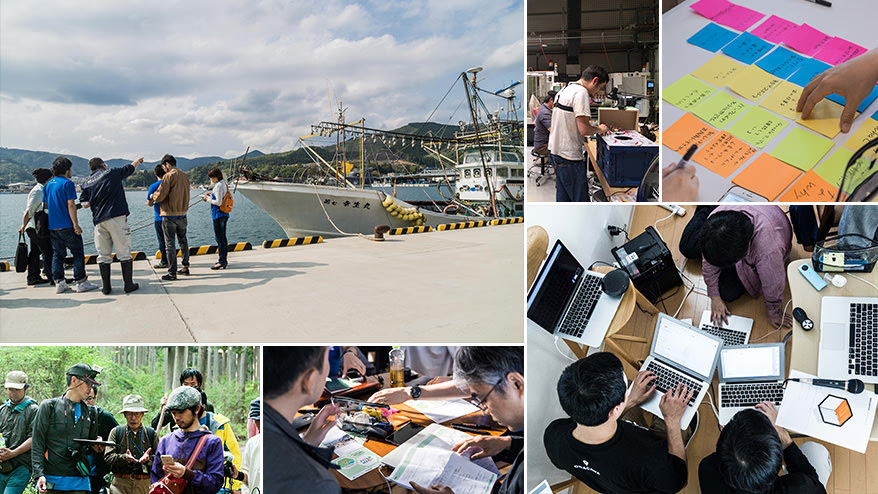こんにちは、プロデュース部の上原です。
突然ではありますが、僕は、テクノロジーやサイエンスに携わる仕事を過去数年間しており、その経験をとおして、それらの持つ力の虜になり、その力を社会に少しでもつなげることを仕事にしたいと考えるようになりました。
そのため、モノサスに入社する際に、引き続き、「テクノロジー ・サイエンス」に携わるプロジェクトに関わりたいです!と希望を出しておりました。
今回は、そんな僕が担当させていただいた「Field Hack ONAGAWA」というプロジェクトについて書きたいと思います。
Field Hack ONAGAWAとは?
僕がモノサスに入社して初めて担当させていただいたのが、プロデュース部が関わっているプロジェクトのひとつ、「Google イノベーション東北」が、情報科学芸術大学院大学、Engadget 日本版と共催した、Field Hack ONAGAWA というイベントです。
まずは、Google イノベーション東北と Field Hack について、概要を説明します。
イノベーション東北とは、各地で地域活性のためプロジェクトへ挑戦する人と、そのプロジェクトに参加したい人とをつなぐ、マッチングプラットフォームです。

場所や仕事を変えることなく、インターネットで参加するという、地域との新しい関わり方を見つけれます。
そんなイノベーション東北が、テクノロジーで地域に新しい変化を起こすきっかけ作りとして始めた新しいプロジェクトが Field Hack !
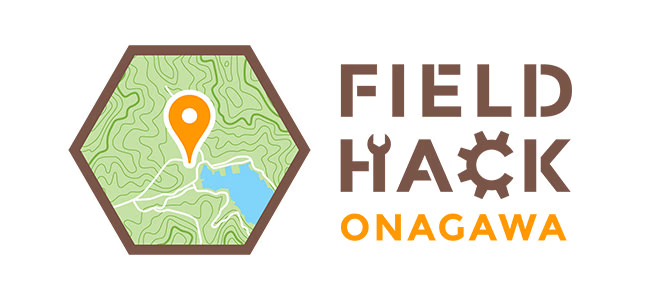
今回は、僕が企画段階から関わらせていただき、プロジェクト管理を担当させていただきました。
日本全国から集まるHackerたち(参加者)が、地域でフィールドワークを行い、そこで発見したヒントをもとに、お互いにアイディア・スキルを出し合いながらコンセプトプロトタイプをつくります。エンジニア、デザイナー、プランナーは勿論、起業家や、公認会計士まで、多様なスキルを持ち合わせた方々に参加いただけました。第 1 回目は、特定非営利活動法人アスヘノキボウの協力のもと、宮城県牡鹿郡女川町で開催しました。
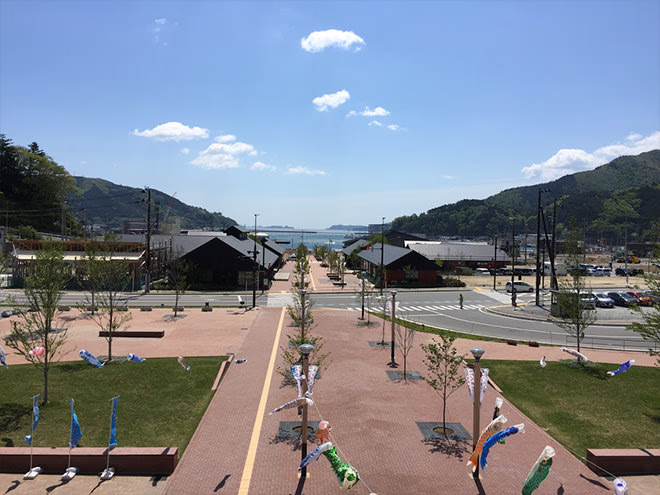
女川町は、震災により人口減少が加速し、日本の地方の数十年先を行っていると言われている一方で、「あたらしいスタートが世界一生まれる町へ。」をスローガンに、将来の日本のモデルになるような、新しい地域のあり方や、社会のあり方、仕事、働き方が次々と生まれています。
まず、女川町の方々により、SEA Hack (海)、TABE Hack(飲食)、YAMA Hack(山)、EDU Hack (教育)、TOWN Hack(町づくり)のテーマが 5つ設けられ、各分野の第一線で活動されている方々が、丁重にフィールドワークを組んでくださいます。最初はテクノロジー ?という感じではありましたが、参加者を信じて、課題を短い時間で参加者に熱心に披露してくださいました。
Hacker たちは、実際に女川町に足を運び、フィールドワークを通じて得たヒントを、ワークショップやディスカッションを通じてアイディアに落とし込みます。
女川町で開催された 1 泊 2 日のイベントです。余談ですがHacker たちが、町内の方々と遅くまで飲み歩いたり、宿泊先で夜な夜な語ったり....熱気が溢れるイベントでした。
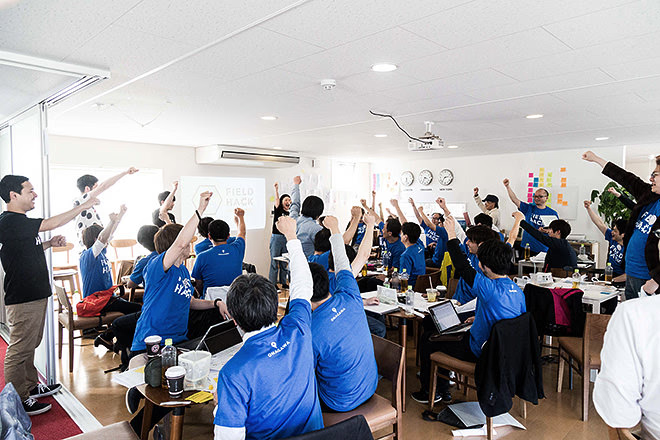
イベント DAY 2 の締めの風景。これから開発期間を迎えます。
その後、各チームは仕事の合間をぬって集まって作業したり、集まれないメンバーはビデオ会議をしたりアイディアのプロトタイプを 3 週間程度で開発しました。
地域の最適なテクノロジーの活用法
そんな、Field Hack ONAGAWA を通じて、テクノロジーを活用して地域だからこそ起こせる変化があると感じました。
地域だからこそ起こせる変化とはなんでしょうか?
極端な例をあげます。
アフリカでは携帯電話の普及率が圧倒的に高いのをご存知でしょうか?
携帯電話の成人の所有率が、2014 年の調査では、南アフリカ共和国とナイジェリアで 89 %、セネガルとガーナで 83 %、ケニアで 82 %、タンザニアで 73 %、ウガンダでは 65 %に対し、
「自宅に固定電話がある」と答えた人はわずか 2 % だそうです。
ちなみに、2002 年に携帯電話を所有している成人はタンザニア、ウガンダ、ケニア、ガーナで約 10 % とのこと。成長の圧倒的なスピードを感じます。
インフラが整理されている都市部であれば固定電話のフェーズを経て、携帯電話に移り変わる中、固定電話が普及しなかったアフリカでは、一つ飛び越えて、携帯電話・スマホ専有率が圧倒的に増えたのです。現在では、商取引も携帯電話・スマホ上で行われ、起業が増えているという話もあるそうです。(地理的環境、定住しないライフスタイル、そして、安定した電源と回線が供給されないインフラの状況などにより固定電話は不備とされたのです。)
出典元
http://www.huffingtonpost.jp/2015/04/22/cell-phones-are-everywhere-in-parts-of-africa_n_7114528.html
ここで何が言いたいかというと、都市部には都市部なりの発展の方法がありますが、
地域には地域に適したテクノロジーがあると思うんです。
それをフィールドワークを通じて発見し(ここが重要!)、プロトタイプに落とし込めたのが今回のプロジェクトだったと思います。
完成したプロトタイプを発表会で見たときに感じたのが、地域の想いと、Hackerたちのものづくりへの想いが重なっているなと。自分たちがこれを作りたい!という想いが表現されていると同時に、女川町にとってもフィールドワークの内容がきちんと反映された、実現性の高い内容ばかりでした。
例えば、今回僕も同行した Sea Hack(海)では、女川町で水産業を営む方より、B to B の取引にLINE を使用していると伺いました。日本全国に点在しているバイヤーの方々より、日々仕入れた魚の種類や数の問い合わせが LINE を通じて入ります。スマホで写真を撮影し、個別にバイヤーの方に連絡を取り合っているということでした。
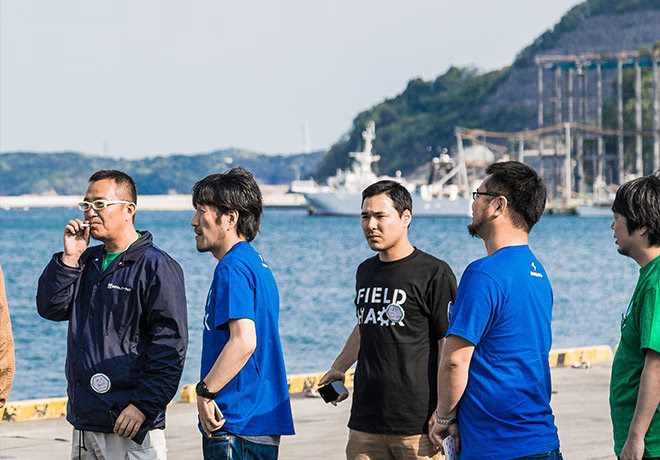
Sea Hack(海)のフィールドワークの様子
個別の対応だとコミュニケーションが煩雑になるということで、Hacker たちが開発したプロトタイプが、「Phoya System」というものです。(女川町の特産物の一つであるホヤにちなんで命名)
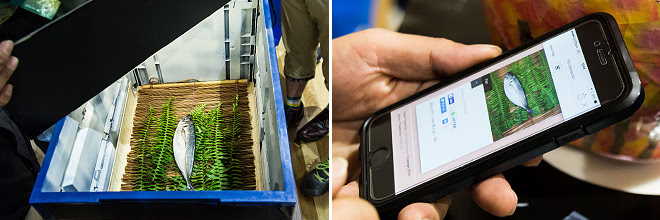
「Phoya System」は、魚の形状・色に一番合う形で写真が撮影できるよう光の調節がスマホ上からでき、撮影した画像はサイトと、メッセンジャーツールに自動でアップされる仕組みになっている。
もし、コミュニケーションを効率化するだけであれば、きっと他の手法もたくさんあったことでしょう。しかし、Hackerたちが画像にも注目したのは、実際に足を運び、魚の保存方法、色の多様性など感じ、またそれが取引にダイレクトに関係するものだと知ったからだと思います。女川町の方々が、真剣にHackerたちに向き合った結果だと。
女川町の基幹産業である水産業が、スマホによって 全国のバイヤーとB to B の取引を簡単にできるようになり、さらに効率を高めることと、魚の情報を画像とともに的確に伝えることをシステムが可能にしました。これがきちんと実装されれば、国外の取引にも活用できると思いました。
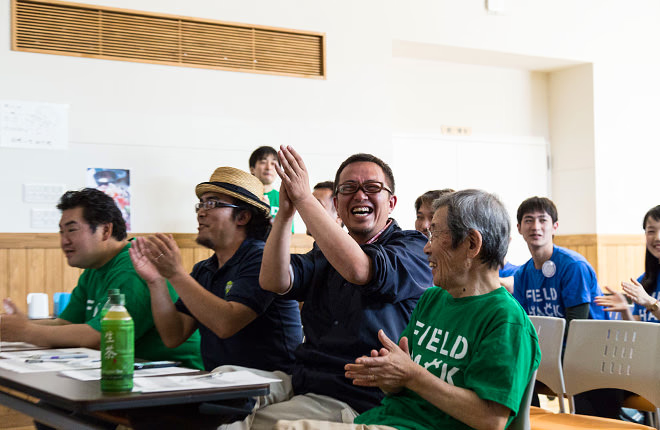
発表会での女川の方々の興奮した様子
バイヤーが集まる都市部では、このアイディアはなかなか考えつかないことであると同時に、女川町のみならず、他地域でも活用できるんじゃないかなーとわくわくしております…。
「テクノロジー・サイエンス」の力と社会をつなげる上で、地域には地域の最適なテクノロジーの活用法がある。それを知るには、地域産業が置かれている状況や特徴、関わる人・地域の想いを、実際に足を運ぶことで知り、Hackerたちのものづくりの想いが重なり、初めてテクノロジーが活きてくる、そして地域に変化をもたらすプロダクトが生まれるのだと感じました。
もちろん容易なことではないし、プロトタイプから次のステージに移る際は、超えなければならないハードルはたくさんあると思います。ひとつでも実現に向かうよう、この先もフォローアップして行きたいと思います!
Hacker と地域の想いが重なり生まれた素敵なプロトタイプの概要は、Field Hack のレポートページにてご確認いただけます!
→イノベーション東北 Field Hack レポートはこちらから
